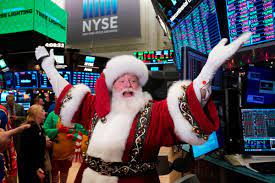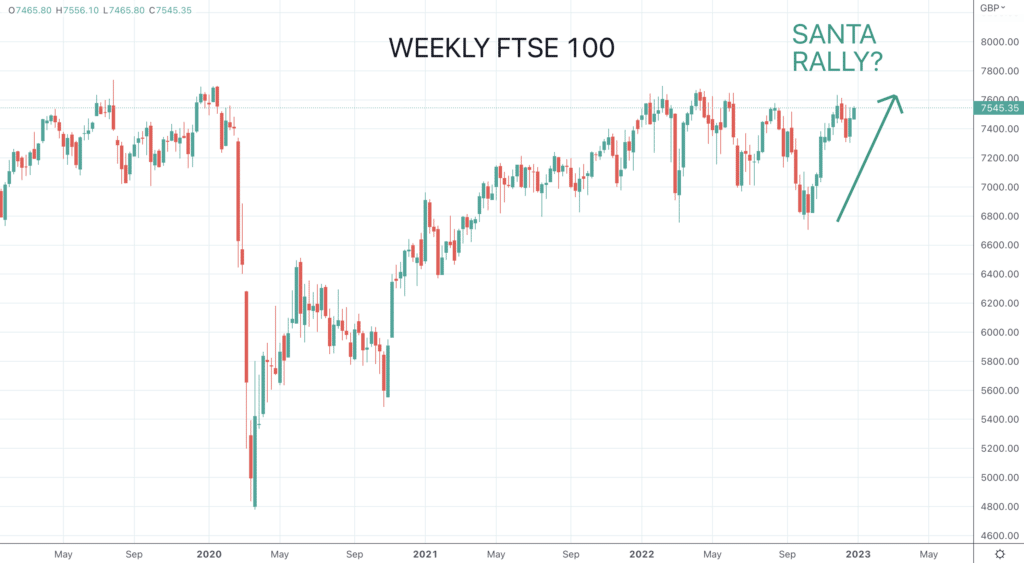We might think that we have to be not cynical, uncynical, to believe that just as Santa brings presents to all the little kiddies so the Santa Rally also provides an annual profit-making opportunity for us traders. Yet the actual explanation of why there is such a rally is profoundly cynical, it incorporates a possibly dark version of human nature. Or, given what we know about human nature, a realistic view.
The Santa Rally is not, as Reuters seems to think, a run up in share prices before Christmas. It is, instead, that these last five trading days of the year – so after Santa – produces a rise in share prices. It’s also not something that happens each end every year – sometimes Santa brings coal after all. This is also entirely different from the Halloween Effect. That’s a function of how in most markets the fiscal year end is the same as the calendar year end, most price moving information comes with the annual results and there we have it – most price moving information comes across the winter months.

Given that Jim Cramer seems to think that the rally could happen perhaps we should assume that it won’t. Seems best given that source. Except the thing is that the Santa Present does often enough come in this last trading week of the year. In fact, viewed properly, it comes each and every year. So, why?
To view it properly first. One description is that stock markets rise – the indices, the S&P 500, or the FTSE100 – in this week. That’s not quite true, it’s one of those things that happens more often than not though. This is something well known enough that even the Wikipedia entry manages to get it right: “stock prices have historically risen 76% of the time”. That is, it’s not a certainty, that the indices rise, but it’s a high probability event. And, well, that’s not really quite right either.

For there are many things that can drive the markets up or down. Central banks hanging interest rates, a major company reporting which boosts or kills off hopes for an entire sector, an asteroid hitting New York, the world’s (and markets) are a complicated place. But if we use that economists’ phrase, ceteris paribus, then there really is that Santa Claus Rally each year. If we hold everything else constant, then markets do better than we would expect in this last week.
That is, we can’t go around expecting a rise in the indices each year, but we can expect the indices to end the week higher than other, objective, conditions would suggest they should. This does, of course, give the economists – and Jim Cramer – an out which is that if the rally doesn’t appear then all other things weren’t equal, were they?
But as to why – this depends upon a cynical, or perhaps rational, view of human nature. The people who manage the big investment funds, their jobs, pay and bonuses depend upon the performance of the funds they run. The usual benchmarking point is year-end – their fiscal year is the calendar year. An extra percentage point or two of performance saves jobs, bumps up bonuses to buying the third house level. So, there’s a strong incentive for those managing the funds to go long in this past week of the year in order to boost performance.
Sure, we can mutter that there are short funds, both-way (which is what a hedge fund is supposed to be) and all that but by far the majority of the market is long only. So, that’s where the effect will be greatest. The weight of money goes long, buys, in order to boost fund performance. That’s it, that’s the rally.
The corollary of this is, of course, that the performance in the first 10 days of January should be a fall against those objective conditions. A specific long push is only going to work over the period that it actually continues to happen after all.
We can say that believing in Santa Claus is to be so uncynical as to be child-like but belief in the rally is to be more hard-headed about human nature. After all, there is no “market view” in any real sense, there’re just 7 billion of us reacting to the incentives we face. Those who manage our money get more of that money if share prices rise in the last week of the year. So, why won’t share prices – everything else equal – rise in the last week of the year? Difficult to see the holes in that argument, really.